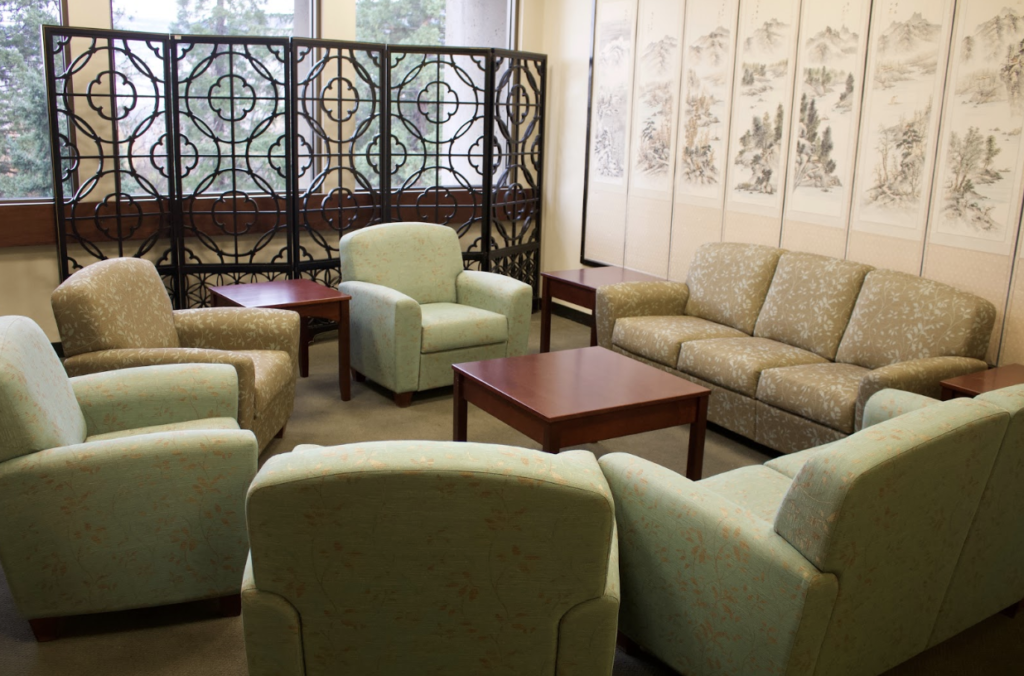It goes without saying, but college students are stressed. Students today have a lot on their plates, with academic troubles, financial aid problems, family and friend issues, and anxiety in general. One can find it hard to maintain a good work-life balance with all that going on in their lives.
In a study that the Student Health and Wellness Center conducted that compared the anxiety between the 2017 to 2018 school years, and the 2018 to 2019 school years, there was found to be a 42% jump between the two years in anxiety among students here at Southern Oregon University. And, on a much broader scale, Oregon itself had a higher average in anxiety than the national average in the spring of 2018, with the national being 22.1% and the Oregon average being 28.3%.
We know there is the Student Health and Wellness Center, which offers counseling for students, but what happens when students need someone to talk to sooner than their appointment, or even want to try group therapy? That’s where the Anxiety Relief Group comes in.
The group was started two years ago by Joan Anderson, a Case Manager in the Office of the Dean of Students. According to the group’s flyers they, “Learn and practice skills in a small group setting to identify and change thought patterns that will ease [one’s] anxiety.”
The Siskiyou spoke with Joan, who shared that she started the group because a lot of students who came into the Office of the Dean of Students who were looking for support, “Were experiencing anxiety [and] a lot of times it was the primary reason they were coming in.” In fact, anxiety was one of the main reasons the students she saw were considering dropping out, as they felt that they couldn’t connect with anyone about it or form any support groups with their peers.

Having experienced anxiety when she was younger, Joan felt a lot of empathy for these students, and set out to form the Anxiety Relief Group. “I thought doing a group would be of value both because we could reach more students with the resources we have,” she said, “as well as the awareness that when we’re anxious, oftentimes we feel isolated.” She explained that she wanted students to feel like they were not alone in their anxiety, that there were other people in the school who felt the same way at them.
She believes that some of the causes of anxiety in students today is a lack of structure. Students are leaving one of the only structures they know about (home, families, friends etc.), and are stepping into this great unknown. “You’re completely on your own as to whether or not you go to class, whether or not you do your homework. There’s a lot of adulting that’s happening to figure out how to manage life situations,” Joan said. This, in turn, can cause a lot of negative thinking for ourselves; like rumination, where ones focuses their attention about things they did or should have done in the past, or catastrophic thinking, where one focuses on the worst case scenario, or thinking of the absolute worst possible things that would happen. Even though this thought process used to help us when we were younger, now, “We’re not really using it in a helpful way, and it really just gets us stuck down and creates a sense of depression and paralyzes us,” Joan stated.
Joan said that by having this group, they could use it to break the stigma on anxiety and other mental illnesses. “There are still stigmas about having any kind of mental health concerns,” Joan said. By having people come to the group for the first time, they realize that they’re not the only one suffering. “It’s relieving to discover that what you have isn’t abnormal. There isn’t anything wrong with you.”
Unfortunately, they are rather short on resources. “We do a really good job cross referencing the resources that we do have, but we’re limited. I mean, we have two case managers in this office for the entire campus,” Joan said in regards to the case managers in the Office of the Dean of Students. “I think the problem is funding. Where does the money come from to provide more school counselors?” And this isn’t a problem primarily at SOU; many schools across the nation are having a, “Crisis in mental health resources,” with not enough resources to provide the mental health services that students need.
Another problem is attendance, as students lives are very busy, and, “Adding one more thing onto their schedule is sometimes more stressful, than helpful,” Joan said. “That’s another reason I’m thinking of doing more groups, in order to serve more students with the limited people we have.” In fact, one of her hopes for the future of the Anxiety Relief Group is having a fuller attendance, so more people can get this experience.
The Siskiyou also spoke with Taylor Burke, the Dean of Students, Director of Student Life, and a Deputy Title IX Coordinator about the Anxiety Relief Group and its benefits for students. She works with the support service team at the school, as well as working with Student Life. She has been instrumental in promoting and supporting the Anxiety Relief Group.
When asked about what some of the causes are for anxiety in students, she replied that there is, “An existential anxiety that is present in our world,” which can come from a multitude of factors. Some of it is, “Ecological concerns and the future of the planet or a national anxiety around what’s happening politically.” While, specifically in college students, “they’re in the middle of the largest transition of their lives, moving from late adolescence into early adulthood.” This can cause a lot of stress on the student, as they’re in this new place, with new experiences that can make them uncomfortable. However, Taylor argues that this discomfort is, “Growth-promoting, and there is some anxiety in that, which is natural and beneficial.” When this anxiety gets too much is when it becomes less growth-promoting and more of a problem.

As for her hopes for the Anxiety Relief Group, and the other support groups the Office of the Dean of Students provides, Taylor wants, “A reduction in stigma,” that seeking help provides. Today, there is a lot of stigma with counseling and asking for help, and so normalizing with this group can help reduce it. A lot of the time, someone with anxiety can get caught up in their own thinking, which can prevent them from going to a group like this or even seeking help in general. Taylor shared that, “People will find in the community both useful and [will be able to build] skills, and know that they’re not the only one.”
Taylor also gave details about the other support services that the Office of the Dean of Students also offers. First, there is the How to Be Okay workshop, which, “Focuses on developing insight and the necessary skills to cope with the stressors of college and adulthood.” Then, there’s Essential Skills for Adulthood and College, which, “Reviews practical skills to be successful as a college student and as an adult. Topics include: navigating college, relationships and consent, educational and personal debt, time management, decision making, and goal setting.”
Both Joan and Taylor offered words of solace for those struggling with anxiety and other mental illnesses. Joan explained that she tells students to, “Prioritize themselves, their well being, and take a risk by trying something new.” To take the risk of attending group therapy or even seeing a counselor on or off campus, can be life changing. Even though that anxiety may never completely go away, “We can learn to manage it in a way that doesn’t negatively impact our lives,” Joan said. With Taylor, it is about learning to practice patience with oneself. “I would really guide students to think about it with a great deal of patience and kindness towards themselves, because we are human,” she said. She recommends students try to appreciate the things that are going well in their lives and to incorporate positive self-talk.
To see students interacting with each other and supporting one another is both of their favorite parts of the group. “I always find myself to be more energized and more enthusiastic at the end of group,” Joan said, “To me, it’s the students who show up and the stories they share, and the ways that they try to help each other.” Having the students in the group relate to one another and helping each other out in their own way is the beauty of the group. As for Taylor, “I have been deeply touched by the unbelievable honestly and vulnerability that I have seen every day with college students, being forward in a group process.” Being vulnerable in a group setting is hard, but one can feel more confident when they have that support with them.
Struggling with mental illness, no matter the serviety, can be hard, but it doesn’t have to be. Knowing that you’re not alone in your struggles and seeking help is one of the first steps to recovery. It can be scary to come to a group therapy session at first, and the results might not be instantaneous, but to borrow from the Anxiety Relief Group’s motto, “Life doesn’t have to be so hard.”
The Anxiety Relief Group is a drop-in group that meets Mondays from 1:30 – 2:30, and Tuesdays from 3:45 – 4:45 in the SU Rm 314. For more information, contact Joan Anderson: andersj13@sou.edu or (541) 552-7473.
How to Be Okay meets Wednesdays from 4:00 – 5:00 pm in SU Rm 323, and Essential Skills for Adulthood & College meets Fridays from 1:00 – 2:00 pm in SU Rm 319. Both of these are drop-in groups. For more information and a full list of topics contact Emily Holgen at holgene@sou.edu.
If you are struggling with suicidal thoughts, call the 24 hour National Suicide Prevention Hotline 1-800-273-TALK (8255).



